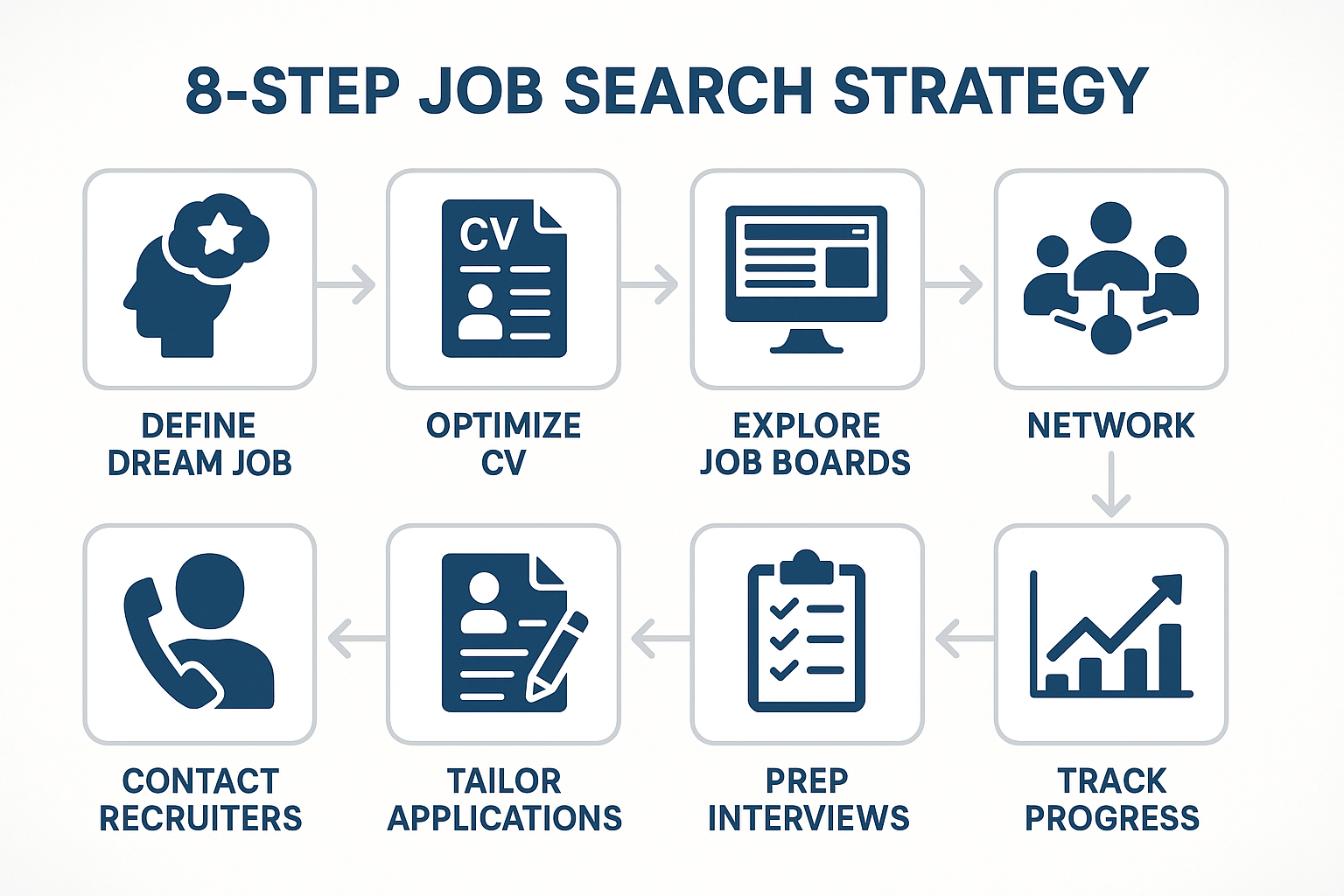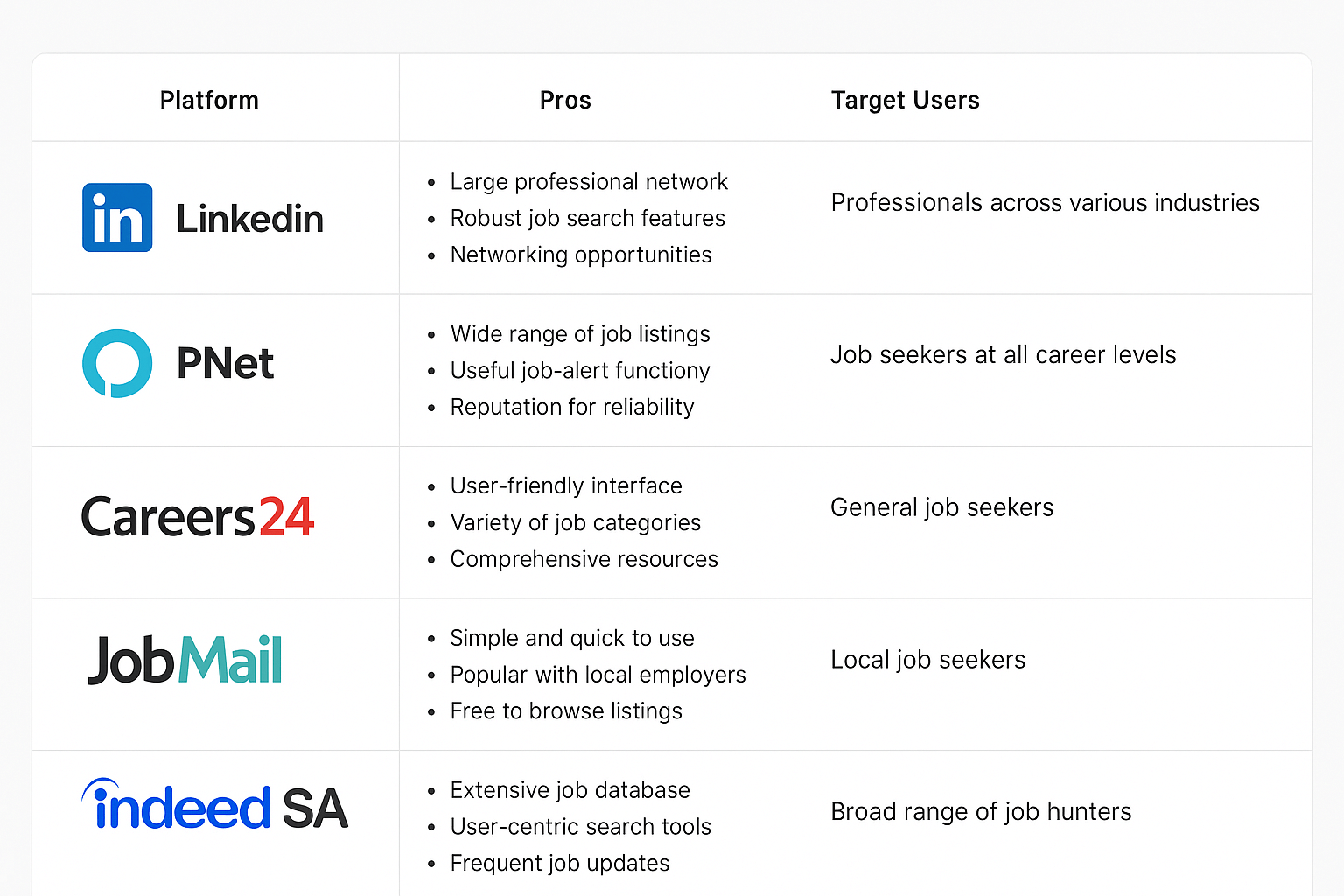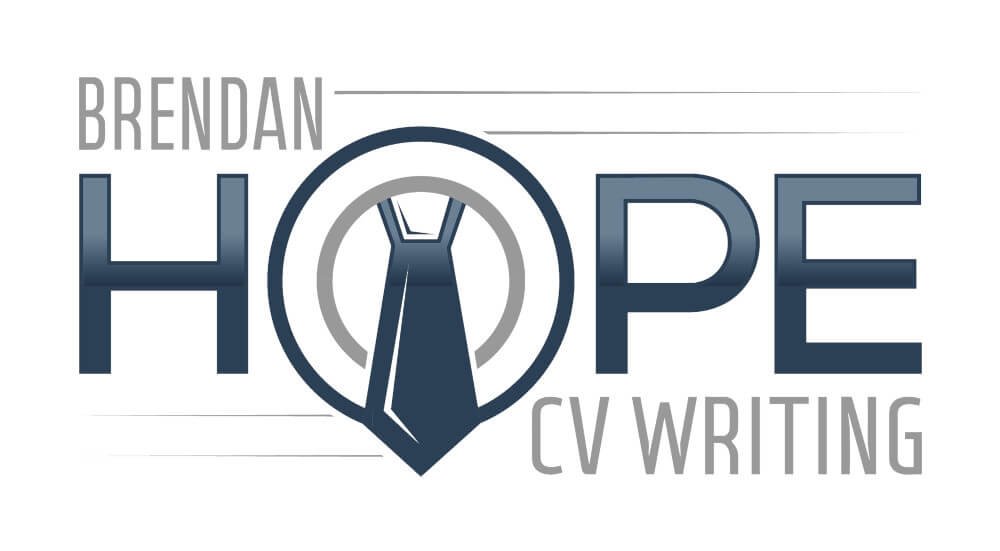Introduction
Landing a great job in South Africa used to be about qualifications and experience alone. But in 2025, those elements are just the bare minimum. Whether you’re a recent graduate, mid-career professional, or someone pivoting into a new field, the modern job hunt demands more than just “hoping for the best.”
You need a strategy, one that’s structured, intentional, and tailored to the unique dynamics of the South African job market.
Recruiters are flooded with applications. Online job platforms are oversaturated. Automation is filtering out even qualified candidates before their CVs are seen.
But here’s the good news:
With the right job search strategy, you can bypass the noise, stand out with confidence, and move from job seeker to job getter.
In this guide, we’ll show you how to take control of your job hunt, step-by-step, and give you the tools you need to land a role that aligns with your career goals, values, and potential. Whether you’re chasing your first opportunity or your next big promotion, this is the playbook South African professionals need to win in 2025.
Why You Need a Job Search Strategy in 2025

The South African job market has never been more competitive, digitally driven, and unforgiving of vagueness. Thousands of qualified candidates apply for the same roles daily, often with similar qualifications, experience, and goals.
So why do some people get callbacks within days while others hear nothing for months?
The difference isn’t always experience. It’s strategy.
📉 The Reality of the South African Job Market
- Youth unemployment remains high, especially among recent graduates.
- Companies increasingly use Applicant Tracking Systems (ATS) to screen CVs.
- There’s a growing preference for remote-ready, adaptable professionals.
- BEE and EE requirements influence hiring in both the public and private sectors.
- Recruiters spend less than 10 seconds on most applications.
This means the “spray and pray” method, applying randomly to every job post you find, simply doesn’t work anymore.
✅ What a Strategic Job Search Looks Like
A job search strategy gives you a clear direction. It includes:
- A well-defined goal (not just “any job”)
- Professionally branded materials (CV, cover letter, LinkedIn)
- Targeted outreach (not mass applications)
- Networking and visibility
- Consistent follow-up and tracking
Instead of wasting time and energy applying for roles that don’t fit, or worse, roles you never hear back from, a strategic job search gets you results faster and with less frustration.
It’s not just about getting a job.
It’s about getting the right job, one that matches your strengths, values, and career trajectory.
Step 1: Define What ‘Dream Job’ Really Means
Before you start applying, networking, or rewriting your CV, you need to be absolutely clear on what you’re aiming for.
Why?
Because the biggest mistake job seekers make is trying to be everything to everyone, and in the process, becoming memorable to no one.
Here’s how to define your dream job in practical, South African terms:
Clarify Your Non-Negotiables
Start with the must-haves. What does your dream job need to include?
- Location: Are you looking in Cape Town, Gauteng, or open to remote?
- Industry: Do you want to stay in your current field or explore something new?
- Type of work: Full-time, freelance, hybrid?
- Salary expectation: What’s your minimum threshold?
- Company culture: Fast-paced startup or structured corporate?
Understand Your Core Strengths
What do you do best, and enjoy most? What do others regularly rely on you for? Your dream job should let you leverage your strengths, not just your past experience.
Align With Your Career Vision
Don’t just chase roles, chase direction. Ask:
- Where do I want to be in 3–5 years?
- Will this role move me closer to or further from that goal?
Lifestyle Fit
Does the job support the life you want to live? Consider work hours, commute, remote flexibility, mental health support, and growth opportunities.
Your dream job isn’t someone else’s definition of success.
It’s the intersection of your skills, values, goals, and lifestyle. Once you define it clearly, your entire search becomes faster, easier, and far more successful.
Step 2: Audit and Upgrade Your Application Materials
Now that you know what you’re looking for, it’s time to ensure your CV, cover letter, and LinkedIn profile reflect that vision and help you compete at the highest level.
Because here’s the truth:
If your materials aren’t aligned with your goals, even the best job search strategy will fall flat.
📄 Start With Your CV
Ask yourself:
- Does my CV target the roles I want?
- Are my achievements measurable and results-driven?
- Is it ATS-optimised for South African job boards?
- Does it clearly reflect my strengths, personality, and potential?
If you’re unsure, this is a good time to explore professional CV writing services, especially if you’re not getting callbacks despite solid experience.
👉 Professional CV Writing Services
✉️ Refresh Your Cover Letter
Generic cover letters no longer work. Each letter should:
- Address the company directly
- Tailor to the role’s requirements
- Highlight value, not just responsibilities
- Use persuasive, confident language
- Align with South African hiring culture and tone
🔗 Optimise Your LinkedIn Profile
Your LinkedIn profile should:
- Use a clear, keyword-rich headline
- Tell a story in the About section
- Highlight achievements, not just tasks
- Include a professional banner and custom URL
- Show alignment with your target role
Think of your CV, cover letter, and LinkedIn as your digital marketing package. Each one should work together to position you as the perfect fit, not just another applicant.
Step 3: Master the South African Job Boards and Platforms

You’ve got your career goals and professional documents sorted, now where do you actually find the right jobs?
In South Africa, there are dozens of job boards, career portals, and recruiter sites. But not all are created equal. A targeted approach saves time, improves relevance, and helps you avoid scams or dead ends.
Here’s where to focus your efforts:
🌐 Top Job Boards in South Africa
| Platform | Best For |
|---|---|
| Professional and executive roles; networking and recruiter outreach | |
| PNet | One of SA’s largest platforms; wide industry coverage |
| Careers24 | General roles, including admin, finance, retail |
| Job Mail | Blue-collar and entry-level roles |
| Indeed South Africa | Aggregated listings; good for broad searches |
| Glassdoor | Job listings with company reviews |
| JobVine | Smaller site, still relevant in niche sectors |
| Gumtree (Carefully) | Use caution, verify legitimacy; useful for contract or part-time work |
✅ Tips for Using Job Boards Effectively
- Create job alerts using specific keywords (e.g., “financial analyst Johannesburg”)
- Apply within 48 hours of a job being posted
- Always write a customised cover letter
- Track your applications in a simple spreadsheet
⚠️ Avoid These Traps
- Scams promising guaranteed work-from-home income
- Applying to roles outside your skill level just to “try your luck”
- Using outdated or template CVs that won’t get through ATS
Remember: You don’t need to be everywhere, you need to be visible in the right places. Prioritise quality over quantity, and tailor each application.
Step 4: Build a Referral-Based Job Search Network

While job boards are useful, the truth is that up to 70% of roles in South Africa are filled via referrals, not online ads. That’s why networking is a critical part of your job search strategy.
But we’re not talking about awkward coffee meetings or begging for favours.
We’re talking about smart, professional relationship-building that positions you at the top of your mind when opportunities arise.
Start With Who You Know
- Past colleagues, classmates, managers, and suppliers
- Alumni from your university or training programme
- Friends working at companies you admire
Use LinkedIn or WhatsApp to reconnect with purpose. Keep it short, clear, and polite.
Have Informational Interviews
Reach out to people in roles or industries you want to explore. Ask them about:
- Their journey
- Industry trends
- Skills in demand
- Company culture
This builds rapport, and may lead to referrals or hidden job leads.
Be Visible on LinkedIn
- Like and comment on relevant industry posts
- Share insights or helpful content
- Congratulate people on career moves
Even light engagement builds familiarity, so when someone is hiring, you come to mind first.
📧 Follow Up Professionally
If someone gives you advice or connects you with a recruiter, follow up to thank them. Keep them updated on your progress. Gratitude sustains networks.
Networking isn’t about taking. It’s about showing up consistently, adding value, and creating genuine career relationships.
Step 5: Use Recruiters and Recruitment Agencies Effectively
Recruiters and agencies can be powerful allies or a complete waste of time, depending on how you engage them.
Many South African professionals assume that sending their CV to five agencies is enough. But like any relationship in the job market, success with recruiters requires strategy, follow-up, and relevance.
✅ Understand What Recruiters Actually Do
Recruiters don’t work for you; they work for the employer. Their job is to fill a vacancy as quickly and accurately as possible. They’re more likely to represent you if:
- You match their current roles or niche
- You present yourself professionally
- You make their job easier
Top South African Recruitment Agencies to Consider
| Agency | Specialties |
|---|---|
| Michael Page SA | Executive and specialist roles |
| Robert Walters SA | Finance, legal, tech |
| DAV Professional Placement Group | Generalist professional roles |
| Adcorp | One of SA’s largest staffing groups |
| Communicate Recruitment | IT, finance, engineering |
| PNet Recruiters | Various sectors via PNet platform |
💡 How to Engage Recruiters Strategically
- Target 3–5 agencies in your field (don’t spam 20+)
- Tailor your outreach message: who you are, what you’re looking for, location, availability
- Attach a clean, ATS-optimised CV
- Follow up once after 7–10 days, not daily
🚫 What Not to Do
- Don’t apply for every job they advertise (unless you match)
- Don’t ghost them if you’re no longer interested
- Don’t ask them to “find you a job” without clarity
Recruiters can fast-track your job search, but only if you approach them like a partner, not a last resort.
Step 6: Tailor Every Application
One of the most common reasons strong candidates get no response is this:
They send the same CV and cover letter to every job.
In 2025, generic applications are deleted within seconds, often by software before a human even looks at them.
Tailoring doesn’t mean rewriting everything. It means adjusting and optimising for relevance and impact.
How to Tailor Effectively (Without Burning Out)
- Use the job title from the listing in your headline or CV summary
- Include keywords directly from the job description
- Mention the company name and address key requirements in your cover letter
- Prioritise most relevant experience near the top of your CV
Create a Master CV
Keep a base version of your CV that you can quickly adjust for different applications. That way, you’re not rewriting from scratch, just customising.
Tailor Cover Letters Too
Your cover letter should:
- Speak directly to the hiring manager or company
- Connect your background with their needs
- Highlight your value-add in the first paragraph
Beat the ATS (Applicant Tracking Systems)
Most companies, even small ones, use ATS tools to filter CVs. Tailoring your application with the right keywords and formatting can mean the difference between shortlist or rejection.
Every application is a pitch. Make it count.
Step 7: Prepare for Every Interview Like a Pro
You’ve landed the interview, now it’s time to show up prepared, confident, and compelling. In South Africa’s competitive job market, simply “winging it” is no longer enough.
Hiring managers want to see clarity, structure, and confidence. Here’s how to bring all three to the table:
Know the Role and the Company
Research beyond the job ad. Visit the company’s:
- Website and LinkedIn page
- Recent press releases or blog posts
- Competitors and market position
Be ready to answer:
“Why do you want to work here?” with insight and sincerity.
Use the STAR Method to Answer Questions
Structure your answers using:
- Situation (What was the context?)
- Task (What were you expected to do?)
- Action (What did you actually do?)
- Result (What changed or improved?)
This method is especially powerful for behavioural interview questions, which are very common in SA hiring processes.
Prepare for These Common Questions
- Tell me about yourself.
- What are your strengths and weaknesses?
- Why are you leaving your current job?
- Where do you see yourself in 5 years?
- What do you know about our company?
Pro Tip: Practice out loud. Record yourself or rehearse with a coach for feedback and confidence-building.
Ask Your Own Questions
At the end of the interview, ask meaningful questions such as:
- What does success look like in this role?
- How would you describe the team culture?
- What are the next steps in the hiring process?
Being prepared doesn’t just impress — it empowers you to take control of the conversation and present your best self.
Step 8: Track, Follow Up, and Stay Consistent
Success in job hunting isn’t just about effort, it’s about staying organised and consistent.
Many job seekers lose momentum or miss out on opportunities because they forget where they applied, don’t follow up, or give up too soon.
Here’s how to stay in control:
Create a Job Search Tracker
Use a simple Google Sheet or Excel document with columns for:
- Job title
- Company name
- Platform applied through
- Date submitted
- Follow-up status
- Outcome (rejected/interviewed/hired)
✅ Tip: Colour-code statuses to stay visually on track.
Follow Up Professionally
If you haven’t heard back within 7–10 business days:
- Send a short, polite follow-up email
- Reaffirm your interest
- Ask if they need anything further
Example:
“I wanted to follow up on my application for the [Job Title] role. I remain very interested in the opportunity and would be happy to provide additional information.”
Manage Your Energy and Expectations
- Set daily or weekly application goals (e.g., three targeted apps/day)
- Schedule time for research, networking, and interview prep
- Celebrate small wins — even a phone screening is progress
Stay Consistent
Most people give up too soon. Stay visible. Keep applying. Keep learning from each step.
Job searching is a numbers game, but with strategy, it becomes a measurable process, not a frustrating mystery.
Common Job Search Mistakes to Avoid
Even highly skilled professionals can sabotage their job search by making small but costly mistakes. Fortunately, most of these are completely avoidable, once you’re aware of them.
Here are the most common job search missteps South Africans make in 2025:
❌ Using One CV for Every Application
Recruiters can spot a generic application instantly. If your CV isn’t tailored to the role, with relevant keywords and highlights, it won’t stand out.
❌ Applying to Everything
Desperation leads to wasted effort. Applying to every job you see, whether relevant or not, only creates burnout and confusion. Be selective and intentional.
❌ Neglecting LinkedIn
An incomplete or inactive LinkedIn profile sends a message: you’re not serious or current. Optimising your LinkedIn can double your visibility and increase recruiter outreach dramatically.
❌ Ghosting Recruiters or Employers
Don’t disappear after receiving a message, interview, or job offer. Professionalism and follow-through matter, even if you decide to decline an opportunity.
❌ Not Following Up
Assuming silence means rejection is a mistake. Often, recruiters are just overwhelmed. A simple follow-up can reignite interest — and position you as proactive.
❌ Poor Email Etiquette
Your tone, grammar, and formatting matter, especially when contacting employers or recruiters. First impressions start before the interview.
Avoiding these mistakes helps you show up as polished, credible, and coachable, all key traits employers love.
Job Search Strategy for Career Changers and Recent Graduates
South Africa’s job market is especially tough for two groups:
🧭 Career Changers
🎓 New Graduates
Here’s how each group can refine their approach:
Career Changers: Pivot with Purpose
Whether you’re shifting industries, returning after a gap, or exploring a new skillset, focus on:
- Transferable skills: Highlight what applies across roles (leadership, problem-solving, project delivery).
- Rebranding your CV: Your experience may not match the job title, but your outcomes and mindset might.
- Cover letter storytelling: Explain the why behind your shift, and what you bring that others don’t.
- Upskilling: Use short courses (Udemy, Coursera, GetSmarter) to bridge gaps in your profile.
Graduates: Build Without Experience
Employers aren’t expecting 5 years of work history, but they are expecting:
- A well-structured CV: Use academic projects, part-time jobs, and volunteer work.
- A strong LinkedIn profile: Show initiative and personality.
- Career clarity: Even if unsure, be clear about what you’re exploring and why.
- Practice interviewing: Start early. Confidence comes from prep, not luck.
👉 Graduate CV Writing & First Job Coaching
No matter where you’re starting from, a clear job search strategy gives you an edge, even over more experienced applicants.
How Our Job Search Coaching Accelerates Results
At Brendan Hope, we’ve helped South African professionals from every background, executives, recent graduates, career changers, land jobs they love through structured, supportive job search coaching.
Here’s how our process works:
✅ 1. Career Discovery + Goal Clarity
We help you define your ideal role, industry, and work environment, based on strengths, values, and vision.
✅ 2. Strategic Application Roadmap
You’ll get a step-by-step plan covering platforms, outreach, networking, and tracking, so you never wonder “what next?”
✅ 3. CV, Cover Letter & LinkedIn Integration
If needed, we align all your documents for consistency, clarity, and keyword relevance, increasing your success rate across applications.
✅ 4. Weekly Check-ins + Interview Prep
We offer accountability, feedback, and interview coaching to keep your momentum up, even when rejections hit.
✅ 5. Real Results
Clients routinely go from:
- No callbacks → multiple interviews
- Overwhelmed → focused and motivated
- Weeks of silence → signed offers in 30–60 days
Job searching doesn’t have to feel like guesswork.
Let’s build your plan, and land that role.
Frequently Asked Questions
How long does a typical job search take in South Africa?
On average, a focused job search takes 4–12 weeks depending on your level, industry, and availability. Having a clear strategy and strong application materials shortens this timeline significantly.
Is it okay to apply for multiple jobs at once?
Yes, but only if each application is tailored. Apply to roles that fit your skills and goals, not just “anything available.” Quality beats quantity every time.
What if I don’t know what kind of job I want?
That’s where job search coaching helps most. We’ll help you define your career direction, clarify your strengths, and identify the best-fit roles for your goals.
Should I use a recruiter or apply directly?
Both. Recruiters can open hidden doors, while direct applications give you control. The best strategy often combines both, depending on your industry.
What if I’ve been unemployed for a long time?
It’s okay; many South Africans are in the same boat. What matters is how you explain the gap and show growth during that time. Strategic CV wording and a confident tone make a big difference.
Do I need a different CV for every job?
Not entirely, but you should adjust your summary, keywords, and highlights to match each role. A small tweak can increase your chances dramatically.
Conclusion: Take Control of Your Career with a Strategy That Works
The South African job market is fast-changing, digitally driven, and fiercely competitive.
But it’s not impossible, not if you approach it with clarity, structure, and support.
Whether you’re entering the workforce, shifting careers, or trying to break free from endless applications with no replies, a smart job search strategy is your best investment.
Because when you know where you’re going, and how to get there, the job hunt becomes empowering, not exhausting.
🎯 Ready to stop guessing and start getting interviews?
Book Your Job Search Strategy Consultation with Brendan Hope Today
Let’s turn effort into results.
Let’s land the job you were meant for.

